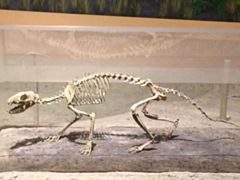Project 4902: X. Wang, R. J. Emry, C. A. Boyd, J. J. Person, S. C. White, R. H. Tedford. 2022. An exquisitely preserved skeleton of Eoarctos vorax (nov. gen. et sp.) from Fitterer Ranch, North Dakota (early Oligocene) and systematics and phylogeny of North American early arctoids (Carnivora, Caniformia). Journal of Vertebrate Paleontology. 42 (sup1):1-123.
Abstract
An exquisitely preserved male skeleton of an early arctoid, Eoarctos vorax new genus and species, provides a unique window into the origin and early divergence of Carnivora. Recovered from the Fitterer Ranch locality in the early Oligocene (Orellan to Whitneyan North American Land Mammal ages) Brule Formation of southwestern North Dakota (∼32 Ma), the new arctoid offers an opportunity to evaluate the fundamental relationships of the caniform (dog-like) carnivorans. Eoarctos vorax possesses a suite of plesiomorphic characters inherited from its miacid ancestors, making it an ideal model for ancestral arctoids. We present a comprehensive treatment of E. vorax, combining traditional description with photographic documentation, microCT, laser scans, and photogrammetry. Showing its plesiomorphic morphology, Eoarctos vorax is scansorial, somewhat like a modern raccoon, retaining the ability to climb trees and lacking cursorial adaptations present in the early canid Hesperocyon. However, E. vorax shows clear signs of durophagous cranio-dental morphology, presumably for an obligatory diet of mollusks, with frequent damage to shell-crushing premolars, plus associated dental infections. We review several other key North American early arctoids and present total-evidence (nuclear DNA and discrete morphological characters) Bayesian and parsimony analyses of Caniformia phylogeny, including extinct stem taxa plus a living member of all modern families. We recognize an endemic North American ursoid clade, Subparictidae, which includes Eoarctos vorax. We demonstrate the importance of North America as an early cradle of evolution for caniform carnivorans, including early precursors of Canidae, Amphicyonidae, Ursidae, and Pinnipedia.Read the article »
Article DOI: 10.1080/02724634.2022.2145900
Project DOI: 10.7934/P4902, http://dx.doi.org/10.7934/P4902
| This project contains |
|---|
Download Project SDD File |
Currently Viewing:
MorphoBank Project 4902
MorphoBank Project 4902
- Creation Date:
03 October 2023 - Publication Date:
03 October 2023
This research
supported by
Authors' Institutions ![]()
- National Museum of Natural History, Smithsonian Institution
- University of California Los Angeles
- Natural History Museum of Los Angeles County
- North Dakota Geological Survey
Members
| member name | taxa |
specimens |
media |
| MorphoBank Curator Project Administrator | 1 | 1 | 1 |
Project has no matrices defined.
Project downloads 
| type | number of downloads | Individual items downloaded (where applicable) |
| Total downloads from project | 3 | |
| Document downloads | 3 | Additional matrix file from the authors (1 download); List of characters and states (1 download); Total evidence matrix (1 download); |

